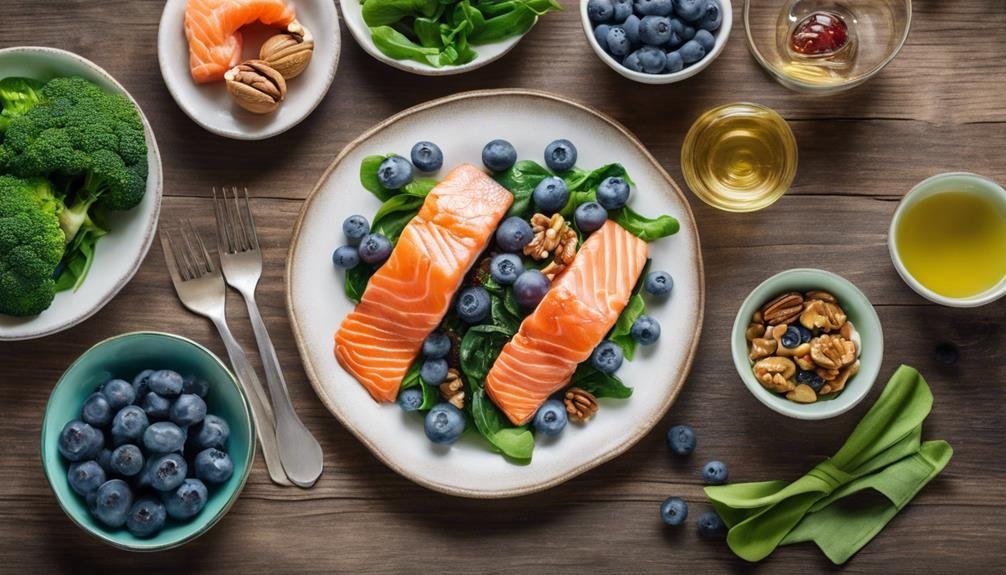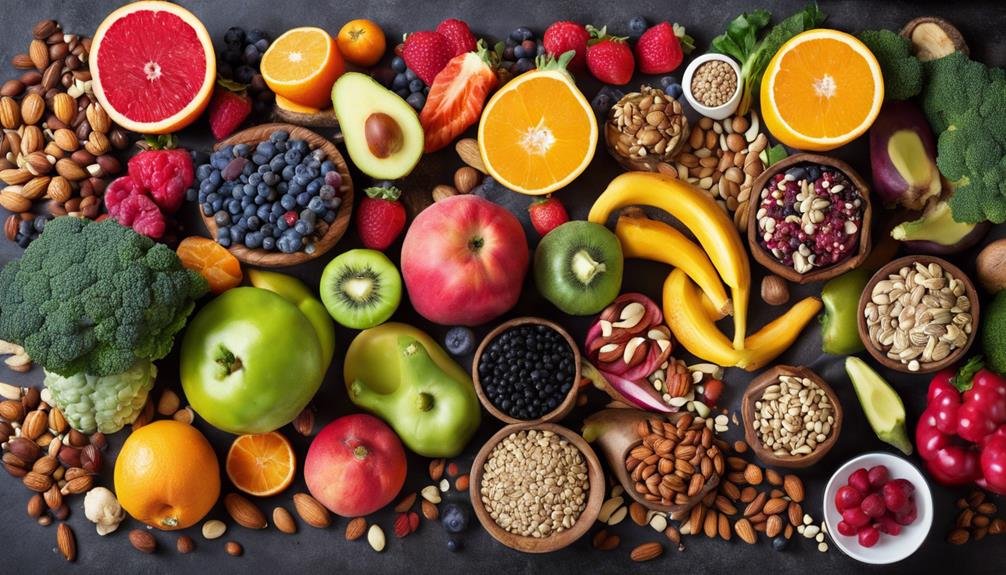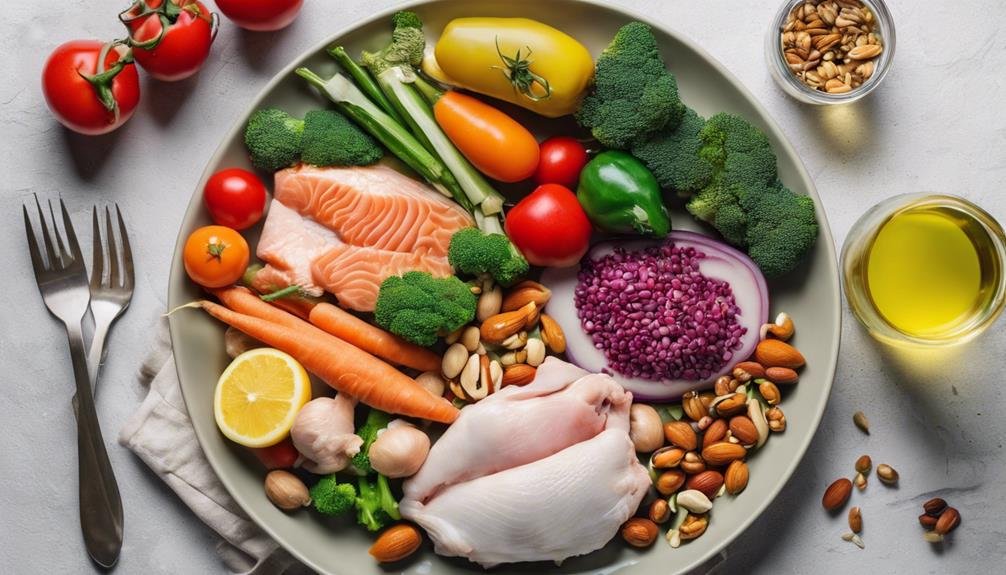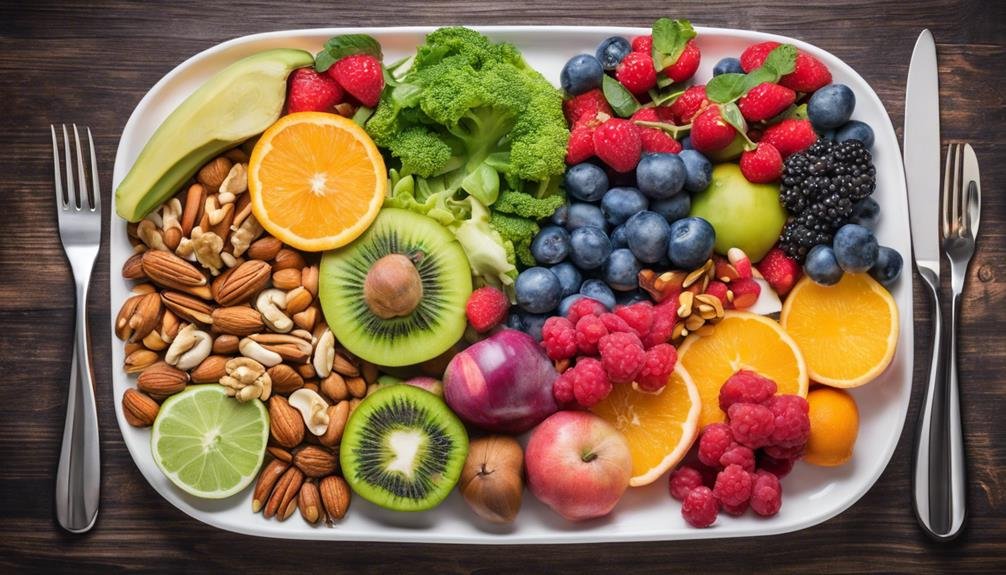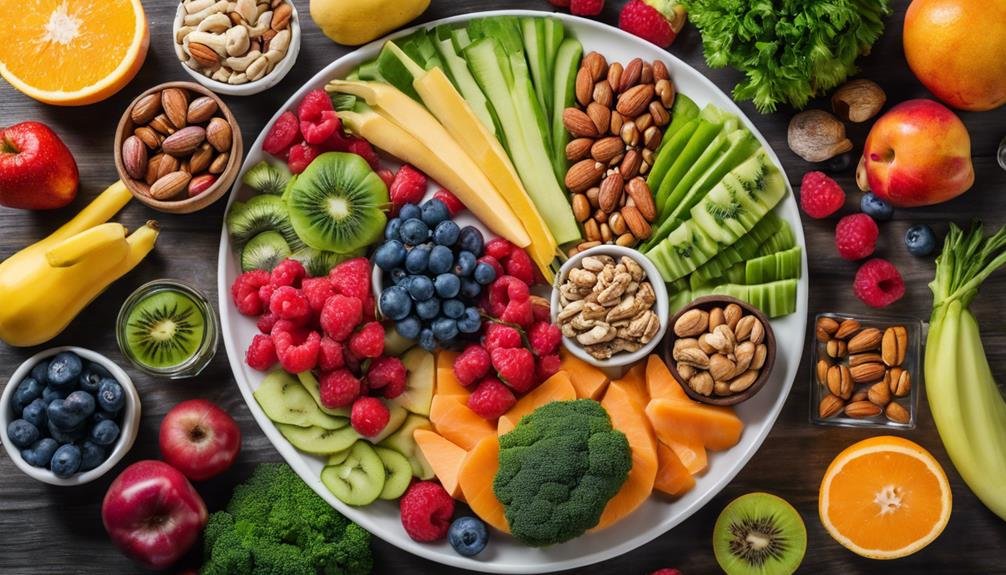Did you know that incorporating top Paleo foods into your diet can help reduce cancer risks significantly? Berries, cruciferous vegetables, turmeric, garlic, and other nutrient-dense foods play a crucial role in fighting off cancerous cells. But that's just the beginning. By exploring the science behind these foods and understanding how they interact with your body, you can make informed choices that may impact your health in profound ways. The key lies in unlocking the potential of these powerful ingredients and harnessing their benefits for a healthier future.
Berries
Exploring the benefits of including berries in your diet is crucial for reducing cancer risk. Berries, such as strawberries, blueberries, raspberries, and blackberries, aren't only delicious but also packed with powerful antioxidants like vitamin C, polyphenols, and flavonoids. These antioxidants play a significant role in fighting oxidative stress and inflammation, two factors that can contribute to the development of cancer. Studies have shown that the regular consumption of berries can help protect cells from damage and reduce the growth of cancerous cells.
Furthermore, berries are rich in fiber, which supports a healthy digestive system by promoting regular bowel movements and reducing inflammation in the gut. A healthy gut is essential for overall well-being and can also influence cancer risk.
Cruciferous Vegetables
Including cruciferous vegetables in your diet can be a powerful strategy in reducing your cancer risk. These nutrient-packed veggies contain compounds that have been shown to have cancer-fighting properties. Here's why you should make sure to include them in your meals:
- Rich in Sulforaphane: Cruciferous vegetables like broccoli, cauliflower, and Brussels sprouts are rich in sulforaphane, a compound known for its potent anti-cancer effects.
- High in Antioxidants: These vegetables are packed with antioxidants like vitamin C and beta-carotene, which help protect your cells from damage that can lead to cancer.
- Detoxification Support: Cruciferous vegetables support your body's natural detoxification processes, helping to eliminate harmful substances and reduce cancer risk.
Fatty Fish
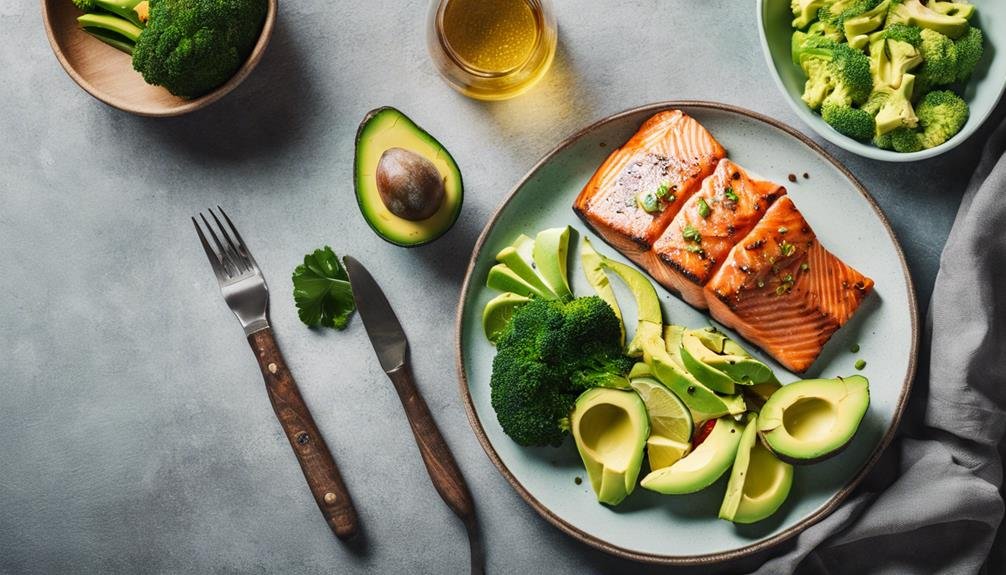
To broaden your cancer-fighting dietary choices beyond cruciferous vegetables, consider incorporating fatty fish into your meals. Fatty fish, such as salmon, mackerel, and sardines, are rich in omega-3 fatty acids, which have been shown to have numerous health benefits, including reducing the risk of cancer. Omega-3 fatty acids possess anti-inflammatory properties that may help combat chronic inflammation, a key factor in the development of various types of cancer.
Studies have suggested that regular consumption of fatty fish is associated with a decreased risk of certain cancers, such as breast, colorectal, and prostate cancer. Additionally, the omega-3 fatty acids found in fatty fish may help inhibit the growth of cancer cells and reduce the risk of metastasis.
Incorporating fatty fish into your diet a few times a week can be a delicious and nutritious way to support your overall health and potentially reduce your risk of developing cancer. Whether baked, grilled, or pan-seared, there are plenty of tasty ways to enjoy the benefits of fatty fish while nourishing your body.
Turmeric
Turmeric, a bright yellow spice commonly used in cooking, holds a wealth of potential health benefits that may contribute to reducing cancer risk. This powerful ingredient contains curcumin, a compound known for its anti-inflammatory and antioxidant properties. Here's how turmeric can support your health:
- Anti-inflammatory Effects: Curcumin in turmeric has been shown to help reduce inflammation in the body, which is linked to the development of cancer.
- Antioxidant Protection: The antioxidants in turmeric can help neutralize harmful free radicals, which play a role in cancer formation.
- Immune System Support: Turmeric may help boost the immune system, aiding in the body's natural defense against cancer cells.
Incorporating turmeric into your diet, such as adding it to curries, soups, or smoothies, can be a flavorful way to potentially reduce your cancer risk. Remember to consult with a healthcare provider before making significant changes to your diet for personalized advice.
Garlic
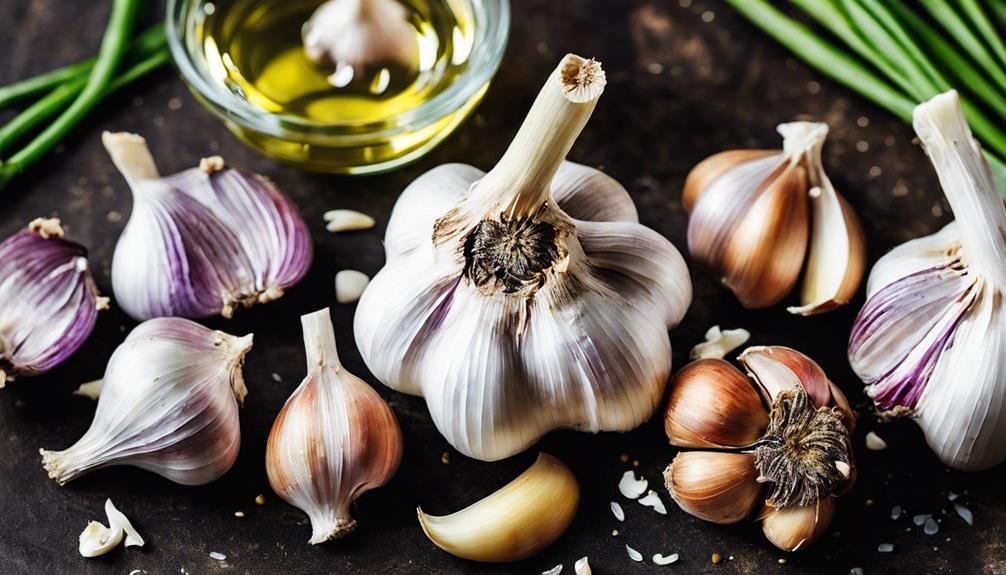
Garlic, a pungent and versatile ingredient found in kitchens worldwide, offers more than just flavor enhancement in your dishes. This humble bulb is packed with potent compounds that have been shown to reduce the risk of certain types of cancer. Allicin, a sulfur-containing compound found in garlic, exhibits strong anti-inflammatory and antioxidant properties, which can help protect your cells from damage that may lead to cancer development. Studies suggest that regular consumption of garlic may lower the risk of developing stomach, colon, and esophageal cancers.
Including garlic in your meals not only adds depth of flavor but also provides potential health benefits. Whether minced, sliced, or roasted, this powerhouse ingredient can be easily incorporated into various dishes to boost both taste and nutritional value.
Embrace the aromatic allure of garlic in your cooking to not only tantalize your taste buds but also potentially reduce your cancer risk.
Nuts and Seeds
Did you know that nuts and seeds aren't only delicious additions to your diet but also potential allies in reducing your risk of cancer? These tiny powerhouses pack a punch when it comes to health benefits. Here's how they can help:
- Rich in Antioxidants: Nuts and seeds are loaded with antioxidants that help combat oxidative stress in your body, a key factor in the development of cancer.
- Anti-Inflammatory Properties: Many nuts and seeds contain anti-inflammatory compounds that can help reduce chronic inflammation, which is linked to an increased risk of cancer.
- Healthy Fats: Nuts and seeds are excellent sources of healthy fats, such as omega-3 fatty acids, which play a role in reducing inflammation and supporting overall health.
Leafy Greens
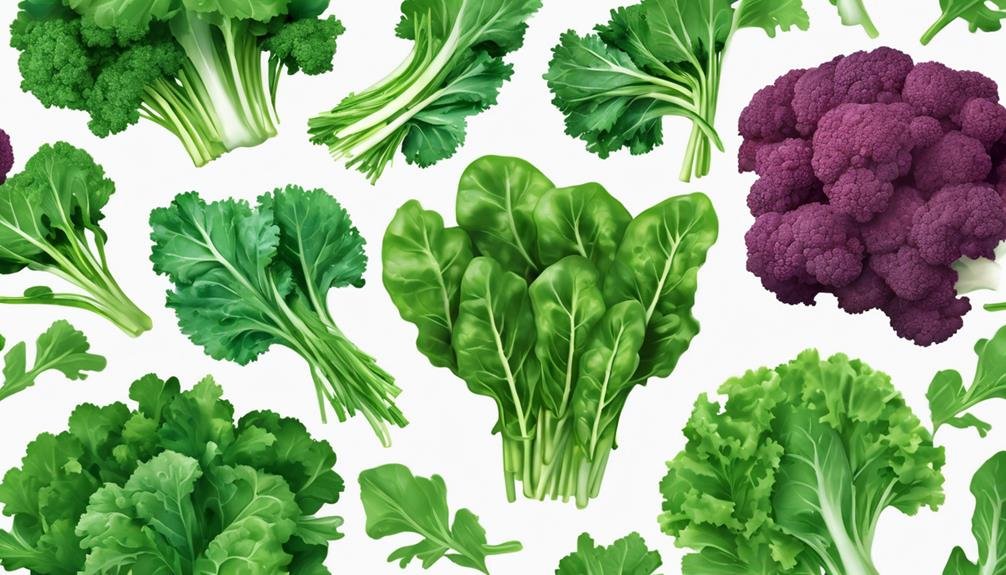
Leafy greens are another group of foods that can significantly contribute to reducing your risk of cancer. These vibrant greens, like kale, spinach, and collard greens, are packed with cancer-fighting properties. They're rich in antioxidants, vitamins, and minerals that help protect your cells from damage and reduce inflammation in the body. Studies have shown that regular consumption of leafy greens is associated with a lower risk of developing various types of cancer, including breast, colon, and lung cancer.
Incorporating leafy greens into your daily diet is simple. You can enjoy them in salads, smoothies, stir-fries, or as a side dish. Try to include a variety of leafy greens in your meals to benefit from their diverse array of nutrients.
Remember to wash them thoroughly to remove any pesticides or dirt, and opt for organic options when possible to reduce exposure to harmful chemicals.
Avocado
Rich, creamy, and versatile, avocado is a superfood that offers numerous health benefits beyond its delicious taste. This nutrient-dense fruit is packed with essential vitamins, minerals, and healthy fats that can help reduce cancer risks and improve overall well-being.
Here are some reasons why incorporating avocado into your diet is a wise choice:
- Rich in Monounsaturated Fats: Avocados are a great source of monounsaturated fats, which have been linked to a lower risk of certain types of cancer.
- High in Antioxidants: Avocado contains powerful antioxidants like lutein and zeaxanthin, which help protect cells from damage and inflammation that can lead to cancer.
- Loaded with Fiber: Fiber is essential for a healthy digestive system and may help reduce the risk of colorectal cancer.
Lean Grass-Fed Meat

Lean grass-fed meat is a nutritious protein source that can play a beneficial role in reducing cancer risk when included as part of a balanced diet. Grass-fed meat contains higher levels of omega-3 fatty acids and antioxidants like vitamin E and beta-carotene compared to conventionally raised meat. These nutrients have been linked to decreased cancer risks and improved overall health. Additionally, grass-fed meat is leaner than grain-fed options, reducing the intake of unhealthy saturated fats.
Including lean grass-fed meat in your diet provides essential nutrients like protein, iron, and zinc, which are crucial for supporting a healthy immune system and cellular function. By choosing grass-fed options, you aren't only benefitting your own health but also supporting sustainable farming practices that prioritize animal welfare and environmental conservation.
When preparing grass-fed meat, opt for healthier cooking methods like grilling, baking, or sautéing to retain its nutritional value. Remember to balance your meat consumption with plenty of vegetables and whole grains to maximize the cancer-fighting potential of your diet.
Mushrooms
Amidst the array of cancer-fighting foods, mushrooms stand out as a potent ally in promoting health and reducing the risk of cancer. These fungi aren't only delicious but also packed with nutrients that can help bolster your body's defenses against cancer. Here's why mushrooms are a must-add to your diet:
- Rich in Antioxidants: Mushrooms contain antioxidants like selenium and glutathione that help protect cells from damage and reduce inflammation, which are key factors in cancer development.
- Immune-Boosting Properties: Compounds in mushrooms, such as beta-glucans, have been shown to enhance the immune system, helping your body fight off cancer cells more effectively.
- Anti-Inflammatory Effects: Chronic inflammation is linked to various types of cancer, and mushrooms have been found to possess anti-inflammatory properties that can help lower the risk of developing cancer.
Bone Broth
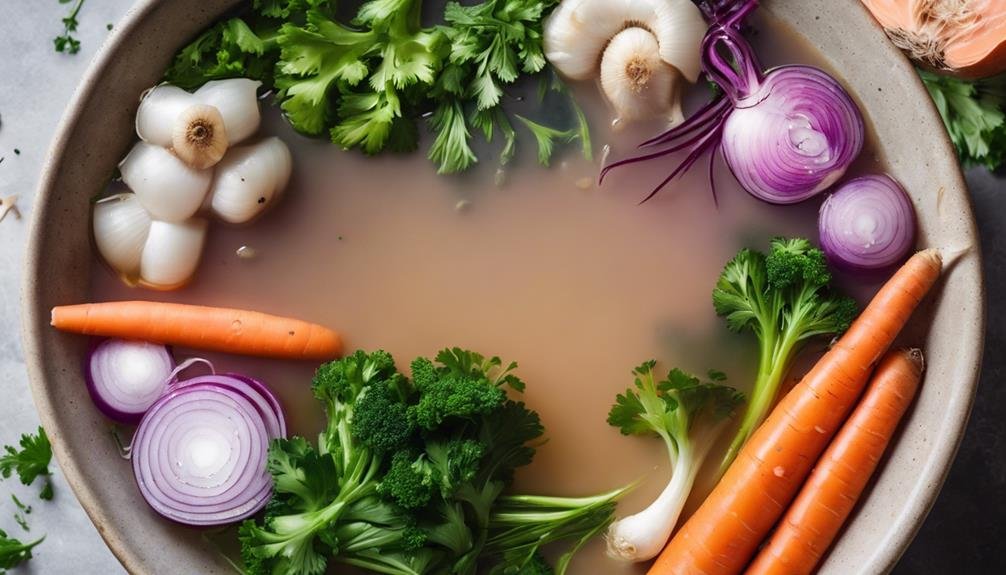
Mushrooms have certainly proven themselves as a cancer-fighting powerhouse, but another contender in the realm of health-promoting foods is bone broth. Bone broth is rich in nutrients like collagen, gelatin, and amino acids that support gut health and reduce inflammation. These components play a crucial role in boosting the immune system and aiding in the body's natural defense against cancer.
Studies have shown that the amino acids found in bone broth, such as proline and glycine, can help repair damaged tissues and improve overall health. The collagen in bone broth supports healthy skin, hair, and nails, while also promoting joint health.
Additionally, the minerals present in bone broth, like calcium, magnesium, and phosphorus, contribute to bone strength and density. By incorporating bone broth into your diet, you're providing your body with essential nutrients that can help reduce the risk of cancer and promote overall well-being. Add this nourishing elixir to your meals to reap its numerous health benefits.
Coconut Oil
Coconut oil has gained popularity in recent years for its potential health benefits and versatile uses in cooking and skincare.
- Rich in Medium-Chain Fatty Acids: Coconut oil contains medium-chain fatty acids like lauric acid, which have been linked to potential anticancer properties.
- Antioxidant Properties: The antioxidants present in coconut oil may help reduce oxidative stress and inflammation in the body, factors that contribute to cancer development.
- Immune System Support: Some studies suggest that the fatty acids in coconut oil could support the immune system's ability to fight off cancer cells.
When considering coconut oil as part of a cancer-preventative diet, opt for virgin or extra-virgin coconut oil to ensure maximum health benefits. While more research is needed to fully understand the extent of coconut oil's impact on cancer risk, incorporating it into your diet in moderation can be a flavorful and potentially beneficial choice. Remember to consult with a healthcare provider before making significant dietary changes.
Frequently Asked Questions
Can Specific Cooking Methods Affect the Cancer-Fighting Properties of These Foods?
Can specific cooking methods affect the cancer-fighting properties of foods?
Yes, cooking methods can impact the nutritional value of food, including cancer-fighting properties. Overcooking or charring certain foods may lead to the formation of potentially harmful compounds.
Opt for gentler cooking methods like steaming, boiling, or light sautéing to preserve the beneficial compounds in these foods. Being mindful of how you cook can help maximize the cancer-fighting benefits of your meals.
Are There Any Potential Side Effects of Consuming These Foods in Large Quantities?
Consuming large quantities of certain foods may lead to potential side effects. It's essential to maintain a balanced diet to avoid negative impacts on your health. Be mindful of portion sizes and vary your food choices to ensure you're getting a wide range of nutrients.
If you have concerns about specific foods, consult with a healthcare provider or nutritionist to create a dietary plan that supports your overall well-being.
Can These Foods Be Beneficial for Preventing Specific Types of Cancers?
When it comes to preventing specific types of cancers, incorporating top Paleo foods into your diet can be highly beneficial.
Foods rich in antioxidants, anti-inflammatory properties, and essential nutrients have been shown to help reduce the risk of certain cancers.
Are There Any Recommended Serving Sizes for Maximizing Cancer-Fighting Benefits?
To maximize cancer-fighting benefits, recommended serving sizes of foods rich in antioxidants and phytonutrients can vary.
In general, aim for a balanced diet with a variety of colorful fruits and vegetables, lean proteins, and healthy fats. Portion control is key to prevent overeating and maintain a healthy weight, which can lower cancer risks.
Consulting a healthcare provider or nutritionist can help tailor specific serving sizes to your individual needs.
How Should These Foods Be Incorporated Into a Balanced, Cancer-Fighting Diet Plan?
To incorporate cancer-fighting foods into a balanced diet plan, focus on variety and moderation. Build meals around whole foods like vegetables, fruits, lean proteins, and healthy fats. Include a mix of colors for diverse nutrients. Limit processed foods and added sugars. Plan your meals ahead to ensure you have the right ingredients on hand. Remember, small changes over time can lead to long-term health benefits.
Conclusion
Incorporating these top Paleo foods into your diet is like building a strong shield against cancer. Imagine each bite as a warrior fighting off harmful cells, protecting your body with powerful antioxidants and anti-inflammatory properties. By choosing these nutrient-rich foods, you are arming yourself with the best defense against cancer risks. So grab that berry, savor that leafy green, and know that each bite is a step towards a healthier, cancer-free future.
